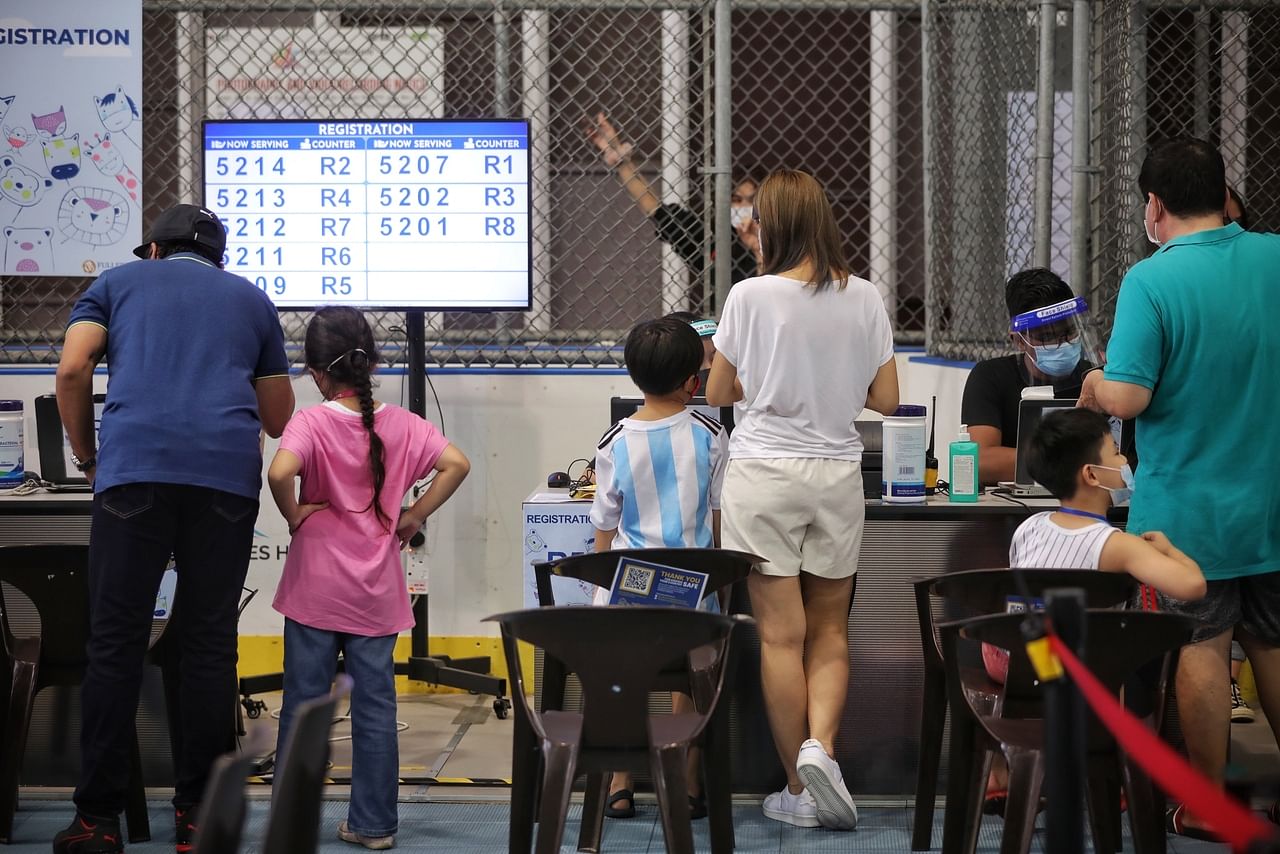No serious side effects from Covid-19 jab reported among children aged 5 to 11: HSA
Sign up now: Get ST's newsletters delivered to your inbox

Parents accompanying their children during a Covid-19 vaccination exercise at Our Tampines Hub Vaccination Centre on Jan 12, 2022.
ST PHOTO: KEVIN LIM
Yeo Shu Hui
Follow topic:
SINGAPORE - No serious suspected adverse events (AEs) associated with the Covid-19 vaccine have been reported for children between five and 11 years old as at Dec 31, said the Health Sciences Authority (HSA).
It has received reports of non-serious AEs such as hives, dizziness, fever and shortness of breath in that age group, it added in a safety update on Wednesday (Jan 19).
Since the Covid-19 vaccination programme was rolled out to children aged five to 11 on Dec 27 last year, six non-serious reports have been logged for this age group.
This is equivalent to 0.03 per cent out of 20,327 administered doses.
For the age group of 12 to 18, the most commonly reported AEs are rash, hives, angioedema - which refers to the swelling of the eyelids, face and lips - as well as shortness of breath, palpitations, chest tightness or discomfort, fever, dizziness, light headedness and syncope, which refers to fainting and brief episode of loss of consciousness.
HSA received 1,170 AE reports associated with the use of mRNA vaccines in adolescents aged 12 to 18, out of 663,239 administered doses.
This makes up 0.18 per cent of doses administered.
The reported AEs generally resolve within a few days, which is in line with events reported overseas.
There were 83 serious AEs including allergic reactions, skin conditions, seizures, dizziness, syncope, myocarditis and pericarditis - types of heart inflammation - as well as tachycardia, which is a fast heart rhythm.
HSA added that 11,490,023 doses of the Pfizer-BioNTech/Comirnaty and Moderna/Spikevax mRNA vaccines were administered between Dec 30, 2020 and Dec 31 last year, out of which 14,729 suspected AE reports were received.
Among those reports, 747 were classified as serious AEs.
HSA said the AEs reported in individuals who had been administered booster doses of the mRNA vaccines were similar to those who had taken the first two doses, and there was no observed increase in the frequency of events.
There were 10 cases of myocarditis and pericarditis reported following 2.2 million booster doses. Rare instances of anaphylaxis, a severe life-threatening allergic reaction, have occurred in both Singapore and abroad after administering the Covid-19 vaccines.
The local incidence rate with mRNA vaccines is estimated at 0.88 per 100,000 doses administered, which is similar to those reported overseas.
There are currently no reports of anaphylaxis from the booster doses.
Among the 332,379 doses of Sinovac-CoronaVac vaccine administered, there were 271 suspected AEs, including 20 serious ones, reported.
There were 75,440 doses of Sinopharm vaccine administered, and 35 suspected AEs, including four serious ones.
HSA said the type and number of reports received for different Covid-19 vaccines are not directly comparable, as they have been used in the inoculation programme for different durations of time.
It added that based on the data to date, the benefits of the vaccines continue to outweigh the known risks when used in a pandemic.
"HSA will continue to closely monitor the safety profile of the Covid-19 vaccines and relevant regulatory actions will be taken to safeguard public health," said HSA.
As at Monday, the Ministry of Health reported that 91 per cent of the eligible population have completed their full regimen of the vaccination and 53 per cent of the total population have received their booster shots.

